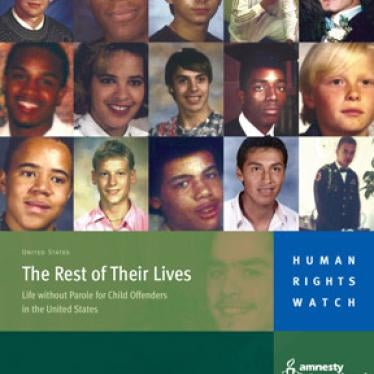(Washington, DC, December 9, 2008) - Michigan's Senate Judiciary Committee should approve four bills abolishing life sentences without parole for juveniles in the state, Human Rights Watch said today in a letter to the committee. The practice is cruel, inappropriate, discriminatory, and a violation of human rights, Human Rights Watch said.
"Michigan has 321 young offenders sentenced to die in prison," said Alison Parker, deputy director of the US Program of Human Rights Watch. "Last week, the House rejected the notion that juveniles are beyond redemption. If these bills pass the Senate, they may be able to earn a chance at freedom."
On December 4, Michigan's 110-seat House of Representatives voted to pass the bills, by margins ranging from 12 to 61 votes, and the bills now move to the Senate. Michigan joins California, Florida, Illinois, Louisiana, Nebraska, and the federal government in taking steps toward ending the sentence of life without parole for offenders under age 18.
In a 2008 update to a series of reports on the sentencing of youth to life without parole, Human Rights Watch reported that Michigan's population of youth serving the sentence is the third-highest in the country, just behind Louisiana and Pennsylvania. There are no youth serving the sentence in the rest of the world.
"Michigan and certain other states in the United States stand alone in locking up kids and throwing away the key," Parker said. "Not a single other country in the world incarcerates offenders under 18 for life without providing them some chance of demonstrating rehabilitation and remorse."
In its letter, Human Rights Watch noted that both brain science research and the 2005 Supreme Court case of Roper v. Simmons recognize that some child offenders have the capacity to turn their lives around even after committing a heinous crime. Acknowledging the suffering of victims and their families because of youth crime, the letter points out that many youth serving life without parole did not physically commit the crime for which they were sentenced. Nearly half of youth sentenced to life without parole surveyed in Michigan were sentenced for aiding and abetting or for an unplanned killing in the course of a felony.
Human Rights Watch also highlighted the racial disparities in sentencing. In Michigan, black youth are serving life without parole at a per capita rate 10 times higher than that of white youth.
Two UN oversight and enforcement bodies, the Human Rights Committee and the Committee on the Elimination of Racial Discrimination, have found that the practice of sentencing juveniles to life without parole violates US human rights treaty obligations.






